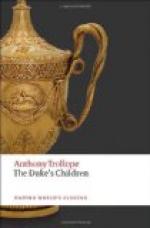Lady Mabel spent the greater part of the afternoon alone, endeavouring to recall to her mind all that she had said to Frank Tregear, and questioning herself as to the wisdom and truth of her own words. She had intended to tell the truth,—but hardly perhaps the whole truth. The life which was before her,—which it was necessary that she should lead,—seemed to her to be so difficult! She could not clearly see her way to be pure and good and feminine, and at the same time wise. She had been false now,—so far false that she had told her friend that she had never been in love. But she was in love;—in love with him, Frank Tregear. She knew it as thoroughly as it was possible for her to know anything;—and had acknowledged it to herself a score of times.
But, she could not marry him. And it was expected, nay, almost necessary that she should marry someone. To that someone, how good she would be! How she would strive by duty and attention, and if possible by affection, to make up for the misfortune of her early love.
And so I hope that I have brought my cart to its appointed place in the front, without showing too much of the horse.
CHAPTER 11
Cruel
For two or three days after the first scene between the Duke and his daughter,—that scene in which she was forbidden either to see or to write to her lover,—not a word was said at Matching about Mr Tregear, nor were any steps taken towards curtailing her liberty of action. She had said she would not write to him without telling her father, and the Duke was too proud of the honour of his family to believe it to be possible that she should deceive him. Nor was it possible. Not only would her own idea of duty prevent her from writing to her lover, although she had stipulated for the right to do so in some possible emergency,—but, carried far beyond that in her sense of what was right and wrong, she felt it now incumbent on her to have no secret from her father at all. The secret, as long as it had been a secret, had been a legacy from her mother,— and had been kept, at her lover’s instance, during that period of mourning for her mother in which it would, she thought, have been indecorous that there should be any question of love or of giving in marriage. It had been a burden to her, though a necessary burden. She had been very clear that the revelation should be made to her father, when it was made, by her lover. That had been done,—and now it was open to her to live without any secrecy,—as was her nature. She meant to cling to her lover. She was quite sure of that. Nothing could divide her from him but his death or hers,—or falseness on his part. But as to marriage, that would not be possible till her father had assented. And as to seeing the man,—ah, yes if she could do so with her father’s assent! She would not be ashamed to own her great desire to see him. She would tell her father that all her happiness depended on seeing him, she would not be coy in speaking of her love. But she would obey her father.




